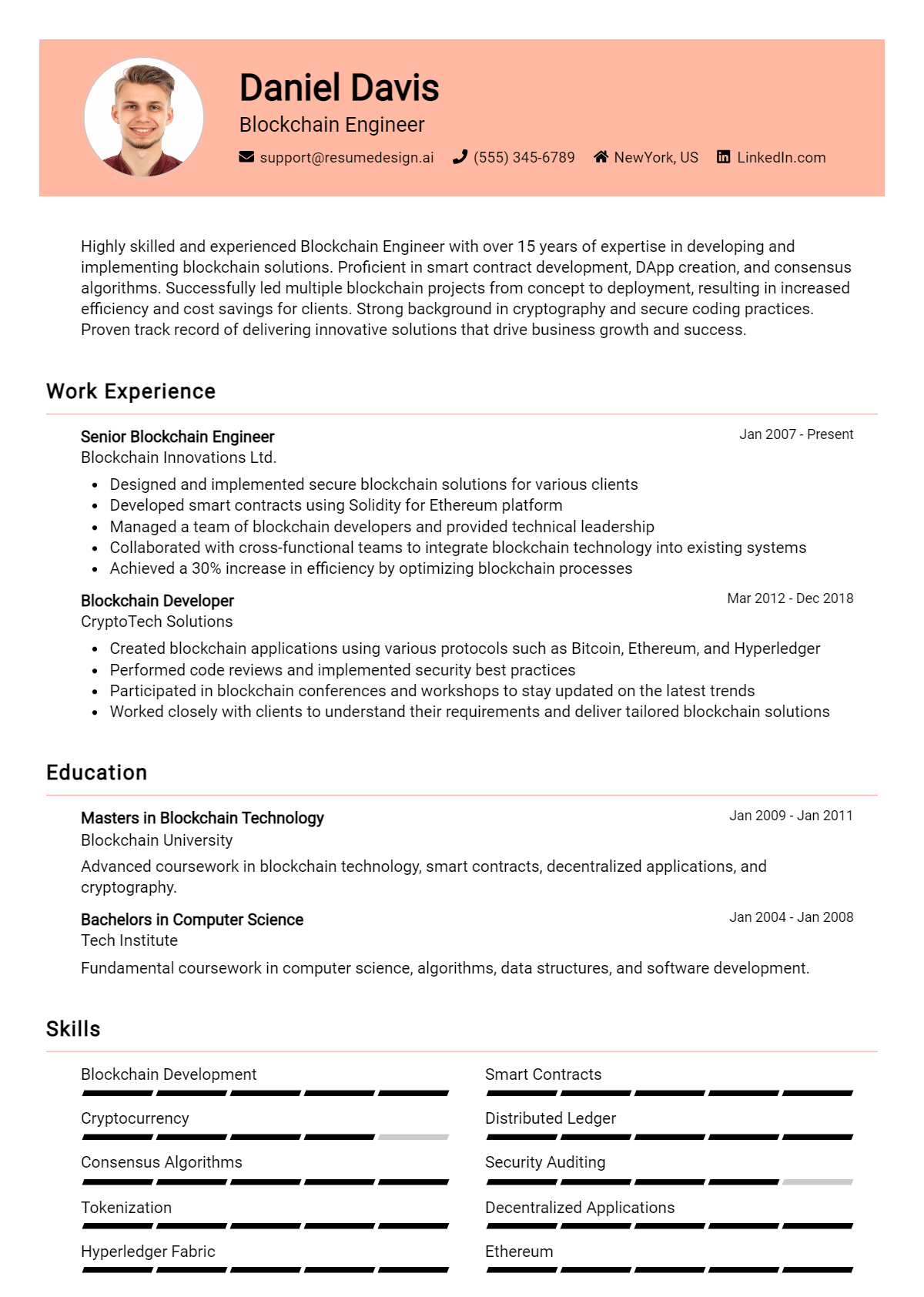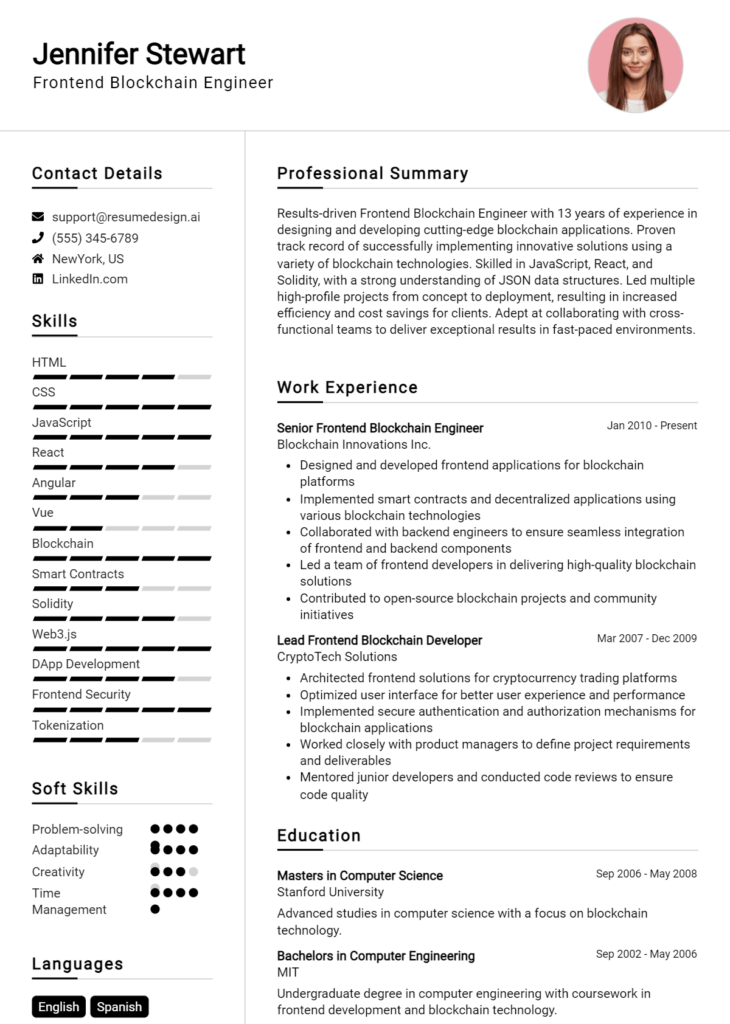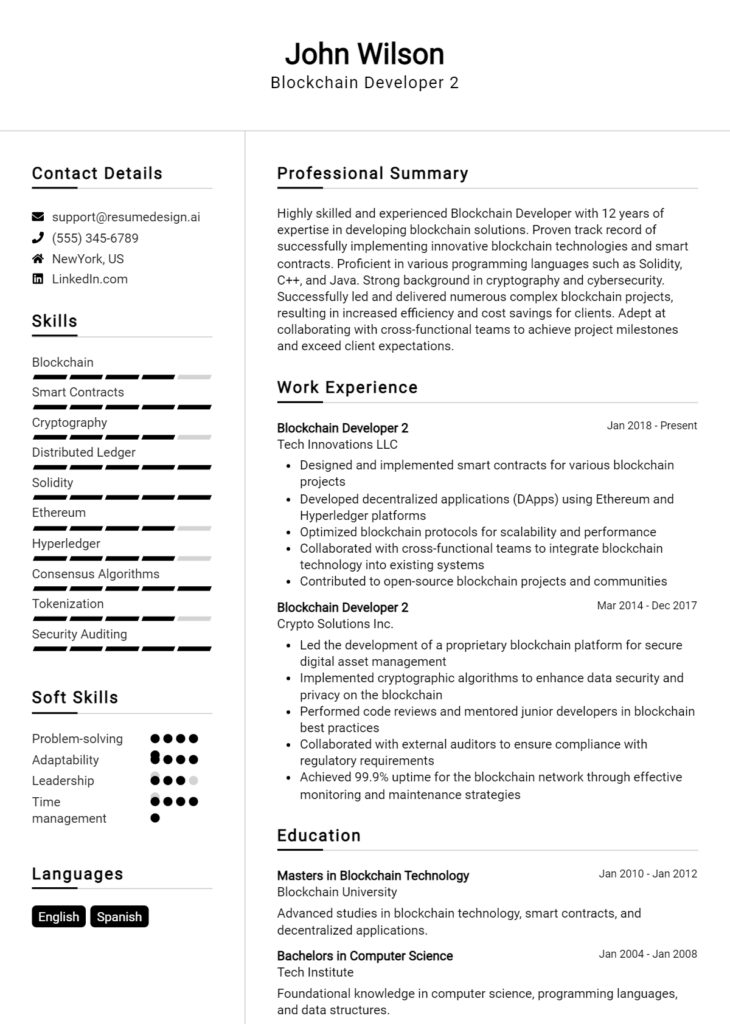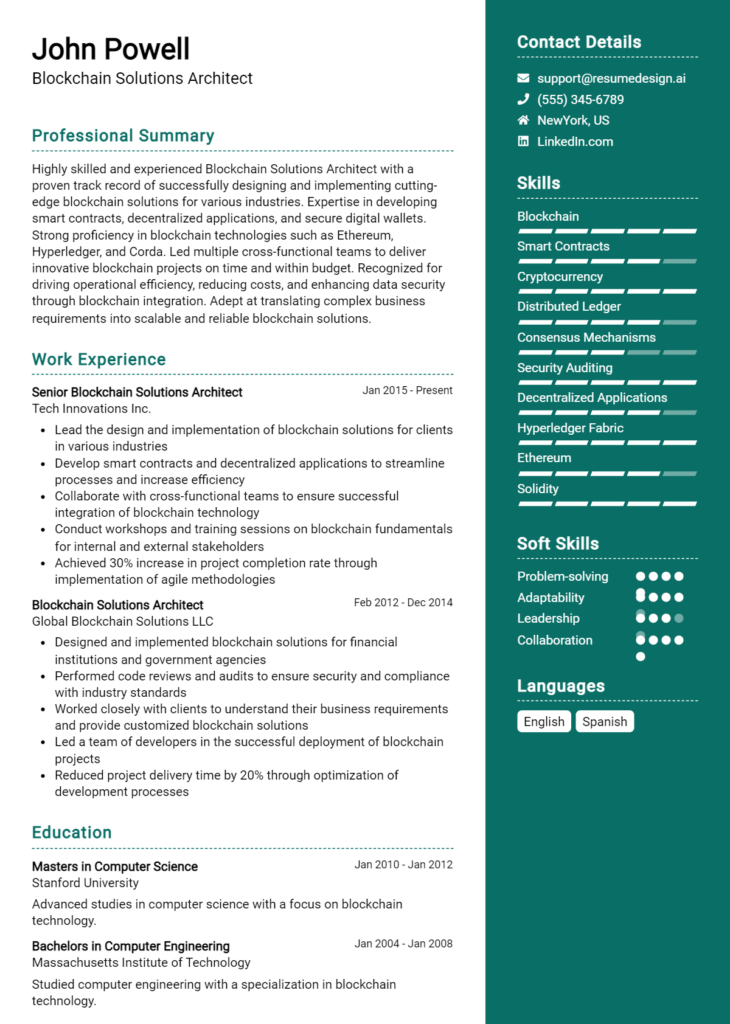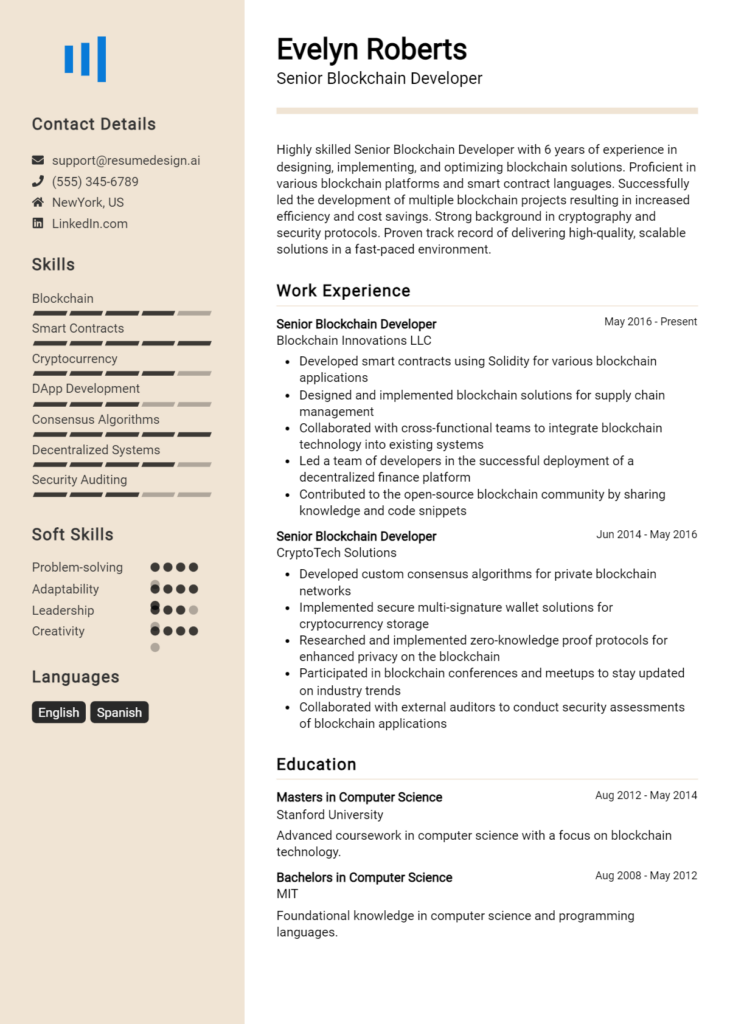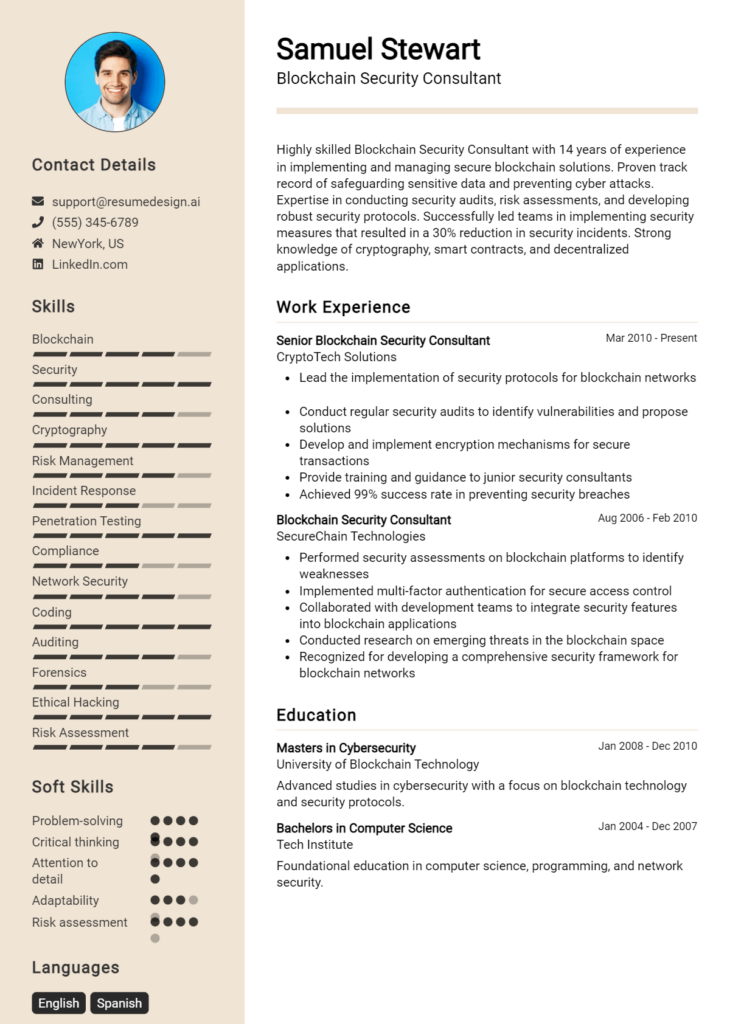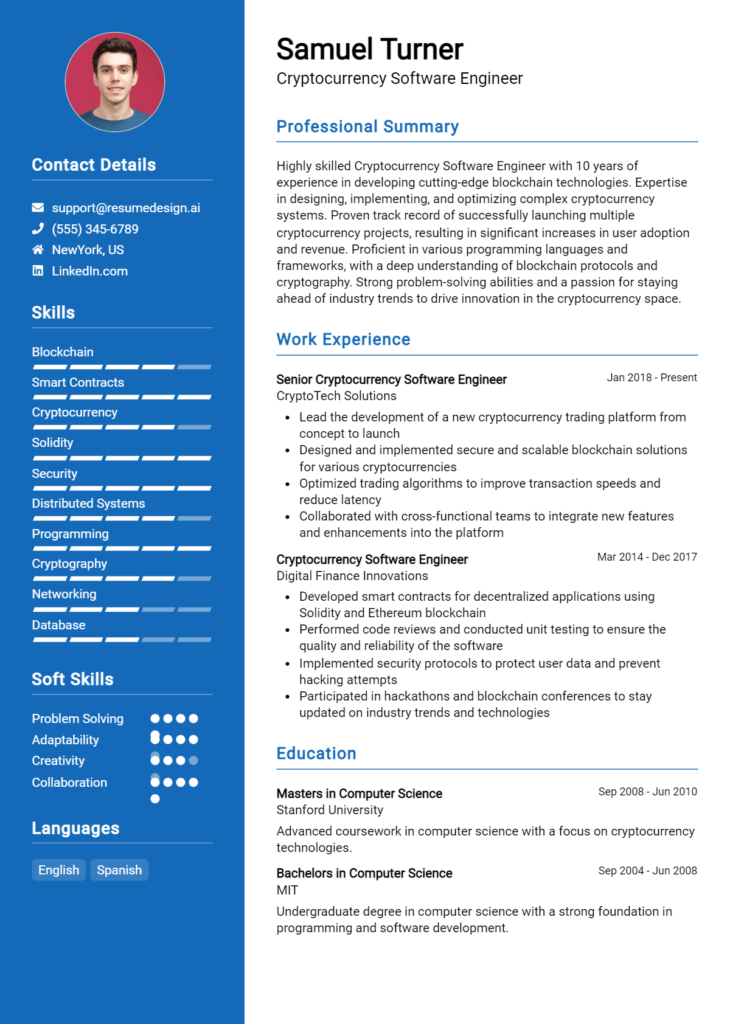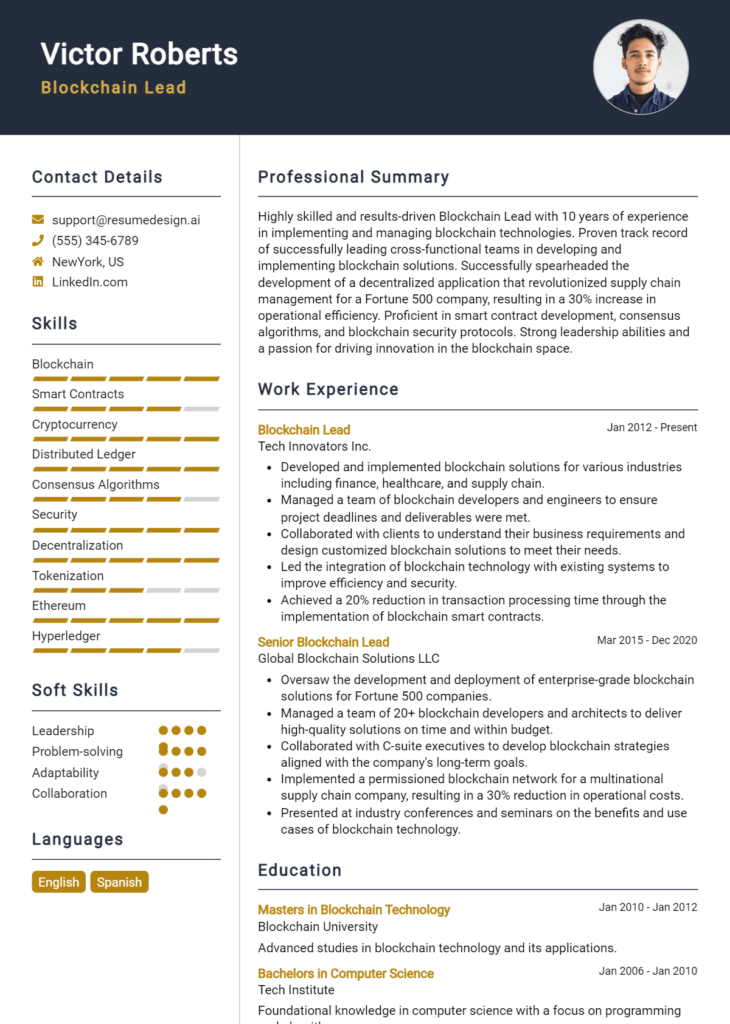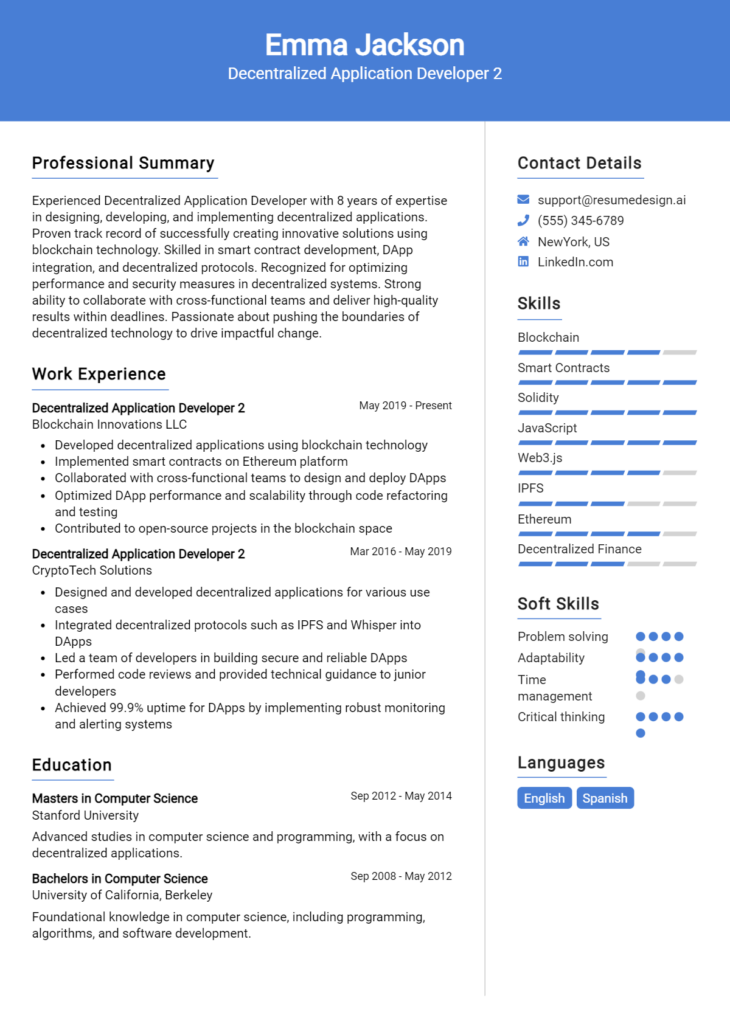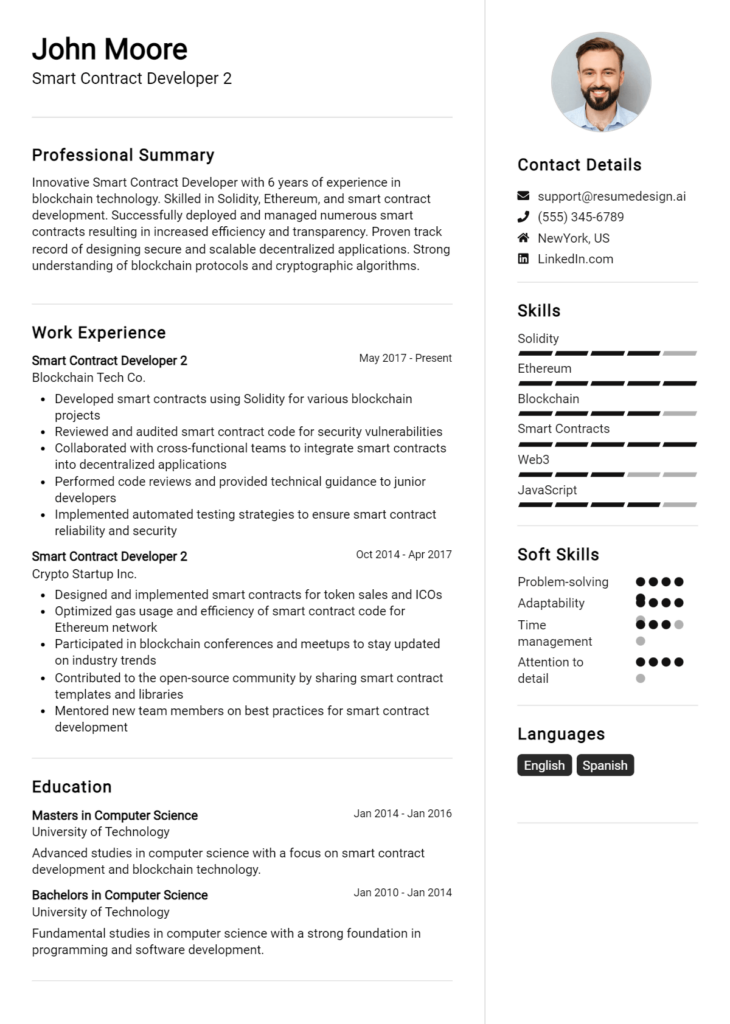Blockchain Engineer Core Responsibilities
A Blockchain Engineer plays a pivotal role in the development and implementation of blockchain technology, bridging various departments such as IT, finance, and operations. They are responsible for designing blockchain protocols, developing smart contracts, and optimizing blockchain performance. Essential skills include strong programming knowledge, problem-solving abilities, and a deep understanding of cryptography and distributed systems. These competencies are vital for achieving organizational objectives, and a well-structured resume can effectively highlight these qualifications, enhancing career opportunities.
Common Responsibilities Listed on Blockchain Engineer Resume
- Design and develop blockchain architectures and protocols.
- Implement smart contracts and decentralized applications (dApps).
- Conduct thorough testing and debugging of blockchain systems.
- Collaborate with cross-functional teams to integrate blockchain solutions.
- Optimize blockchain performance and scalability.
- Research and analyze emerging blockchain technologies.
- Ensure compliance with regulatory requirements and security standards.
- Maintain documentation of blockchain projects and processes.
- Provide technical support and training for blockchain users.
- Evaluate and improve existing blockchain systems.
- Participate in code reviews and maintain code quality standards.
High-Level Resume Tips for Blockchain Engineer Professionals
In today's competitive job market, a well-crafted resume is essential for Blockchain Engineer professionals seeking to make their mark in a rapidly evolving industry. Your resume often serves as the first impression you make on a potential employer, making it crucial to effectively showcase your skills, achievements, and unique contributions. A compelling resume not only highlights your technical expertise but also communicates your understanding of blockchain technology and its applications. This guide will provide practical and actionable resume tips specifically tailored for Blockchain Engineer professionals to help you stand out in a crowded field.
Top Resume Tips for Blockchain Engineer Professionals
- Tailor your resume to each job description by incorporating relevant keywords and phrases.
- Highlight your technical skills, including programming languages (e.g., Solidity, JavaScript) and blockchain platforms (e.g., Ethereum, Hyperledger).
- Showcase relevant experience, detailing specific projects you have worked on and your role in them.
- Quantify your achievements with metrics; for example, mention how your work improved transaction speeds or reduced costs.
- Include certifications or courses related to blockchain technology to demonstrate your commitment to continuous learning.
- Emphasize soft skills such as problem-solving, teamwork, and communication, which are critical in collaborative environments.
- Utilize a clean, professional format that improves readability and highlights key sections effectively.
- Incorporate a summary statement at the top of your resume that encapsulates your experience and aspirations in the blockchain space.
- Keep your resume concise, ideally one page, while ensuring it is rich in relevant information.
By implementing these tailored resume tips, you can significantly increase your chances of landing a job in the Blockchain Engineer field. A focused and well-structured resume not only demonstrates your technical capabilities but also showcases your dedication to the industry, making you a more attractive candidate to potential employers.
Why Resume Headlines & Titles are Important for Blockchain Engineer
In the competitive field of blockchain engineering, a well-crafted resume headline or title plays a crucial role in capturing the attention of hiring managers. A strong headline can serve as a powerful summary of a candidate's key qualifications, instantly highlighting their expertise and relevance to the position being applied for. With hiring managers often sifting through numerous resumes, a concise and impactful headline can make a significant difference, providing a quick insight into the candidate's skills and experience. Therefore, it is essential for blockchain engineers to create headlines that are not only relevant but also capable of making a strong first impression.
Best Practices for Crafting Resume Headlines for Blockchain Engineer
- Keep it concise—aim for one impactful phrase.
- Be role-specific, highlighting your expertise in blockchain technology.
- Use relevant keywords that align with the job description.
- Showcase your most significant achievements or skills.
- Avoid vague language; be precise about your qualifications.
- Incorporate metrics or results, if applicable.
- Make it unique to distinguish yourself from other candidates.
- Revise and tailor your headline for each job application.
Example Resume Headlines for Blockchain Engineer
Strong Resume Headlines
"Innovative Blockchain Engineer with 5+ Years of Experience in Smart Contract Development"
“Certified Blockchain Developer Specializing in Decentralized Applications and Cryptography”
“Results-Driven Blockchain Engineer with Proven Success in Scaling Blockchain Solutions”
Weak Resume Headlines
“Blockchain Engineer Looking for Opportunities”
“Tech Professional with Blockchain Skills”
The strong headlines are effective because they succinctly convey the candidate's relevant experience, specialization, and achievements, making them stand out in a crowded field. In contrast, the weak headlines lack specificity and fail to highlight significant qualifications, resulting in a missed opportunity to engage hiring managers. By focusing on what sets them apart, candidates can create memorable impressions that lead to further consideration.
Writing an Exceptional Blockchain Engineer Resume Summary
A resume summary is an essential component for a Blockchain Engineer as it serves as the first impression that hiring managers will have of a candidate. This brief yet impactful introduction quickly captures attention by showcasing key skills, relevant experience, and significant accomplishments tailored to the specific job role. A well-crafted resume summary should be concise and engaging, providing a snapshot of the candidate's qualifications that aligns with the needs of the employer, ultimately setting the stage for a deeper evaluation of the candidate's resume.
Best Practices for Writing a Blockchain Engineer Resume Summary
- Quantify achievements: Use numbers and metrics to demonstrate the impact of your contributions.
- Focus on relevant skills: Highlight technical skills and tools pertinent to blockchain development.
- Tailor the summary: Customize the summary for each job application to match the job description closely.
- Be concise: Aim for 2-4 sentences that capture the essence of your professional experience.
- Showcase industry knowledge: Mention familiarity with blockchain concepts, protocols, and technologies.
- Highlight problem-solving abilities: Illustrate your capacity to tackle challenges within blockchain projects.
- Emphasize collaboration: Note experience in working with cross-functional teams and stakeholders.
- Include certifications: Mention any relevant certifications or training that add credibility to your expertise.
Example Blockchain Engineer Resume Summaries
Strong Resume Summaries
Results-driven Blockchain Engineer with over 5 years of experience in developing decentralized applications (dApps) and smart contracts on Ethereum, achieving a 30% reduction in transaction costs for clients through innovative blockchain solutions.
Detail-oriented Blockchain Developer proficient in Solidity and Hyperledger Fabric, having successfully led a team to deploy a blockchain-based supply chain system that improved transparency and reduced fraud by 40% within the first year.
Creative Blockchain Engineer with a strong background in cryptography and security protocols, recognized for implementing a secure wallet solution that increased user adoption by 50%, leading to a significant boost in platform revenue.
Weak Resume Summaries
Experienced engineer looking for opportunities in blockchain technology.
Blockchain enthusiast with some knowledge of programming languages seeking a position in the field.
The strong resume summaries are considered effective because they are specific, quantify achievements, and directly relate to the role of a Blockchain Engineer, showcasing clear impacts and relevant skills. In contrast, the weak resume summaries lack detail and measurable outcomes, making them too vague and generic, which fails to engage hiring managers' interest.
Work Experience Section for Blockchain Engineer Resume
The work experience section of a Blockchain Engineer resume is crucial as it serves as a comprehensive showcase of the candidate's technical skills, ability to manage teams, and track record of delivering high-quality blockchain solutions. This segment not only highlights relevant experience but also allows candidates to quantify their achievements, demonstrating their impact in previous roles. Aligning this experience with industry standards is vital, as it provides potential employers with a clear understanding of the candidate's capabilities and how they can contribute to the success of the organization.
Best Practices for Blockchain Engineer Work Experience
- Highlight specific blockchain technologies and programming languages used (e.g., Solidity, Ethereum, Hyperledger).
- Quantify achievements with metrics (e.g., improved transaction speeds by 30%, reduced costs by 20%).
- Showcase leadership experiences, such as leading a team of developers or managing blockchain project timelines.
- Detail collaborative efforts with cross-functional teams (e.g., working with product managers and UI/UX designers).
- Include relevant certifications or training completed during tenure.
- Describe involvement in open-source projects or contributions to blockchain communities.
- Focus on problem-solving capabilities and innovative solutions implemented.
- Tailor experience descriptions to match job descriptions and industry requirements.
Example Work Experiences for Blockchain Engineer
Strong Experiences
- Led a team of 5 developers in designing and deploying a decentralized application on Ethereum, resulting in a 40% increase in user engagement within the first three months.
- Implemented a smart contract solution that reduced transaction processing time from 10 seconds to 3 seconds, enhancing overall system efficiency by 70%.
- Collaborated with cross-functional teams to develop a blockchain-based supply chain management system that decreased operational costs by 25% and improved traceability.
- Contributed to an open-source blockchain project, increasing community engagement by 50% and earning recognition in the developer community.
Weak Experiences
- Worked on various blockchain projects with no specific details or outcomes provided.
- Assisted in developing a blockchain application but did not specify the technologies used or the results achieved.
- Participated in team meetings regarding blockchain initiatives but did not clarify individual contributions or impact.
- Involved in coding tasks for blockchain systems without mentioning the scale, technologies, or any measurable results.
The experiences categorized as strong are compelling because they include specific, quantifiable outcomes that demonstrate the candidate’s technical abilities and leadership skills. They highlight concrete achievements and contributions to projects, showcasing how the individual has added value to their previous roles. In contrast, the weak experiences lack detail and measurable impact, making it difficult for potential employers to assess the candidate's true capabilities and contributions to the field of blockchain engineering.
Education and Certifications Section for Blockchain Engineer Resume
The education and certifications section in a Blockchain Engineer resume plays a critical role in establishing a candidate's academic foundation and technical expertise in this rapidly evolving field. This section not only showcases the candidate's formal education but also highlights any industry-recognized certifications and ongoing learning initiatives. By providing relevant coursework, specialized training, and certifications that are aligned with the demands of blockchain technology, candidates can significantly enhance their credibility and demonstrate their commitment to staying abreast of the latest developments and best practices within the industry.
Best Practices for Blockchain Engineer Education and Certifications
- Prioritize relevancy by focusing on degrees and certifications specifically related to blockchain technology, computer science, or software engineering.
- Include detailed information such as the name of the institution, date of completion, and any honors or distinctions received.
- Highlight advanced or specialized certifications from recognized organizations, such as Certified Blockchain Developer or Certified Ethereum Developer.
- Incorporate relevant coursework that showcases your knowledge of blockchain principles, distributed ledger technologies, and smart contract development.
- Keep the section concise, avoiding excessive details on unrelated educational experiences.
- Consider including any online courses or bootcamps that focus on blockchain technologies to illustrate continuous learning.
- Use clear formatting and bullet points for easy readability, making sure the most impressive qualifications stand out.
- Regularly update this section to reflect new certifications or educational opportunities undertaken after employment.
Example Education and Certifications for Blockchain Engineer
Strong Examples
- M.S. in Computer Science with a specialization in Blockchain Technology, Stanford University, 2023
- Certified Blockchain Developer (CBD), Blockchain Council, 2022
- Relevant Coursework: Distributed Ledger Technologies, Cryptography, and Smart Contracts, MIT, 2021
- Blockchain Fundamentals, Coursera, 2023
Weak Examples
- B.A. in Philosophy, University of California, 2010
- Certification in Basic Computer Literacy, 2015
- Online course on Excel, Udemy, 2020
- High School Diploma, 2008
The strong examples listed demonstrate a clear alignment with the skills and knowledge required for a Blockchain Engineer role, showcasing relevant degrees, specialized certifications, and coursework that directly pertains to blockchain technology. Conversely, the weak examples illustrate educational qualifications and certifications that lack relevance to the field, highlighting outdated or unrelated skills that do not contribute to a candidate's suitability for a Blockchain Engineer position.
Top Skills & Keywords for Blockchain Engineer Resume
In the rapidly evolving field of blockchain technology, a strong resume is essential for aspiring Blockchain Engineers. A well-crafted resume not only showcases your technical expertise and relevant work experience but also highlights your soft skills that are crucial for collaboration and problem-solving in a complex technical landscape. Employers often look for candidates who can not only write efficient code but also effectively communicate ideas and work as part of a team. Therefore, emphasizing both hard and soft skills is paramount to stand out in a competitive job market.
Top Hard & Soft Skills for Blockchain Engineer
Soft Skills
- Problem-solving
- Critical thinking
- Communication
- Teamwork
- Adaptability
- Attention to detail
- Creativity
- Time management
- Analytical thinking
- Conflict resolution
Hard Skills
- Proficiency in blockchain platforms (e.g., Ethereum, Hyperledger)
- Smart contract development
- Knowledge of consensus algorithms
- Programming languages (e.g., Solidity, JavaScript, Python)
- Cryptography and security protocols
- Familiarity with distributed ledger technology
- API integration
- Knowledge of data structures and algorithms
- Experience with cloud services (e.g., AWS, Azure)
- Understanding of regulatory compliance in blockchain
For a successful application, it's important to include these skills in your resume. To enhance your resume further, you can explore how to effectively showcase your work experience and tailor your skills to match the job description.
Stand Out with a Winning Blockchain Engineer Cover Letter
Dear [Hiring Manager's Name],
I am excited to apply for the Blockchain Engineer position at [Company Name], as advertised on [where you found the job listing]. With a strong background in software development and a deep understanding of blockchain technology, I am confident in my ability to contribute effectively to your team and help drive innovative solutions for your projects. My experience in designing and implementing decentralized applications, coupled with my passion for advancing blockchain use cases, aligns perfectly with [Company Name]'s vision for the future of digital transactions.
In my previous role at [Previous Company Name], I led a team that developed a smart contract platform that streamlined supply chain operations, resulting in a 30% reduction in transaction costs. I am proficient in various programming languages, including Solidity, JavaScript, and Go, and have hands-on experience with platforms such as Ethereum and Hyperledger. My ability to analyze complex problems and develop efficient algorithms has been instrumental in my success in creating scalable and secure blockchain solutions. I am eager to bring this expertise to [Company Name] and work collaboratively to enhance your innovative projects.
I am particularly drawn to [Company Name] because of your commitment to [specific aspect of the company or its projects], and I believe my skills in blockchain technology can contribute to your mission. I am excited about the opportunity to collaborate with a talented team and leverage my experience in both technical development and project management to deliver high-quality solutions. Thank you for considering my application. I look forward to the possibility of discussing how I can add value to your team.
Sincerely,
[Your Name]
[Your LinkedIn Profile]
[Your Contact Information]
Common Mistakes to Avoid in a Blockchain Engineer Resume
When crafting a resume for a Blockchain Engineer position, it's essential to avoid common pitfalls that can detract from your qualifications and expertise. A well-structured resume not only showcases your technical skills but also highlights your problem-solving abilities and understanding of blockchain technology. Here are some common mistakes to steer clear of when creating your resume:
Lack of Specificity: Failing to specify your experience with particular blockchain platforms (like Ethereum, Hyperledger, etc.) can make your resume less impactful. Tailor your experience to the technologies relevant to the job.
Overloading with Jargon: While technical terms are important, using excessive jargon can alienate non-technical reviewers. Aim for a balance that communicates your expertise without confusing the reader.
Ignoring Soft Skills: Blockchain engineers often work in teams, so neglecting to highlight soft skills such as communication, collaboration, and problem-solving can be a missed opportunity to demonstrate your fit for the role.
Outdated Information: Including outdated technologies or skills can make you appear less competitive. Always ensure your resume reflects the latest industry trends and tools.
Neglecting Project Outcomes: Simply listing your responsibilities without discussing the outcomes or impact of your projects can weaken your resume. Highlight achievements and how your contributions led to successful results.
Formatting Issues: A cluttered or inconsistent layout can make your resume hard to read. Use a clean, professional format with clear headings and bullet points to enhance readability.
Omitting Relevant Certifications: In the rapidly evolving field of blockchain, relevant certifications can set you apart. Failing to list certifications like Certified Blockchain Developer or similar can be a missed opportunity.
Generic Objective Statements: Using a generic objective statement can make your resume blend in with others. Customize your objective to reflect your specific goals and how they align with the organization’s needs.
Conclusion
As we conclude our exploration of the essential skills, responsibilities, and qualifications for a Blockchain Engineer, it's crucial to reflect on how effectively your resume communicates your expertise in this rapidly evolving field. We discussed the importance of proficiency in programming languages such as Solidity and JavaScript, familiarity with blockchain platforms like Ethereum and Hyperledger, and the need for a solid understanding of cryptography and distributed systems.
Additionally, we highlighted the significance of showcasing relevant project experience and certifications that demonstrate your technical capabilities and commitment to continuous learning. Your resume should not only outline your technical skills but also convey your ability to collaborate within teams and communicate complex concepts to non-technical stakeholders.
Now is the perfect time to review your Blockchain Engineer resume and ensure it aligns with industry expectations. To assist you in this endeavor, consider utilizing a variety of available tools. Explore resume templates that can help structure your resume effectively. A resume builder can streamline the process, making it easier to create a polished final product. Additionally, you can draw inspiration from resume examples tailored for Blockchain Engineers, and don't forget to craft a compelling cover letter using our cover letter templates.
Take the next step in your career by refining your resume today!

